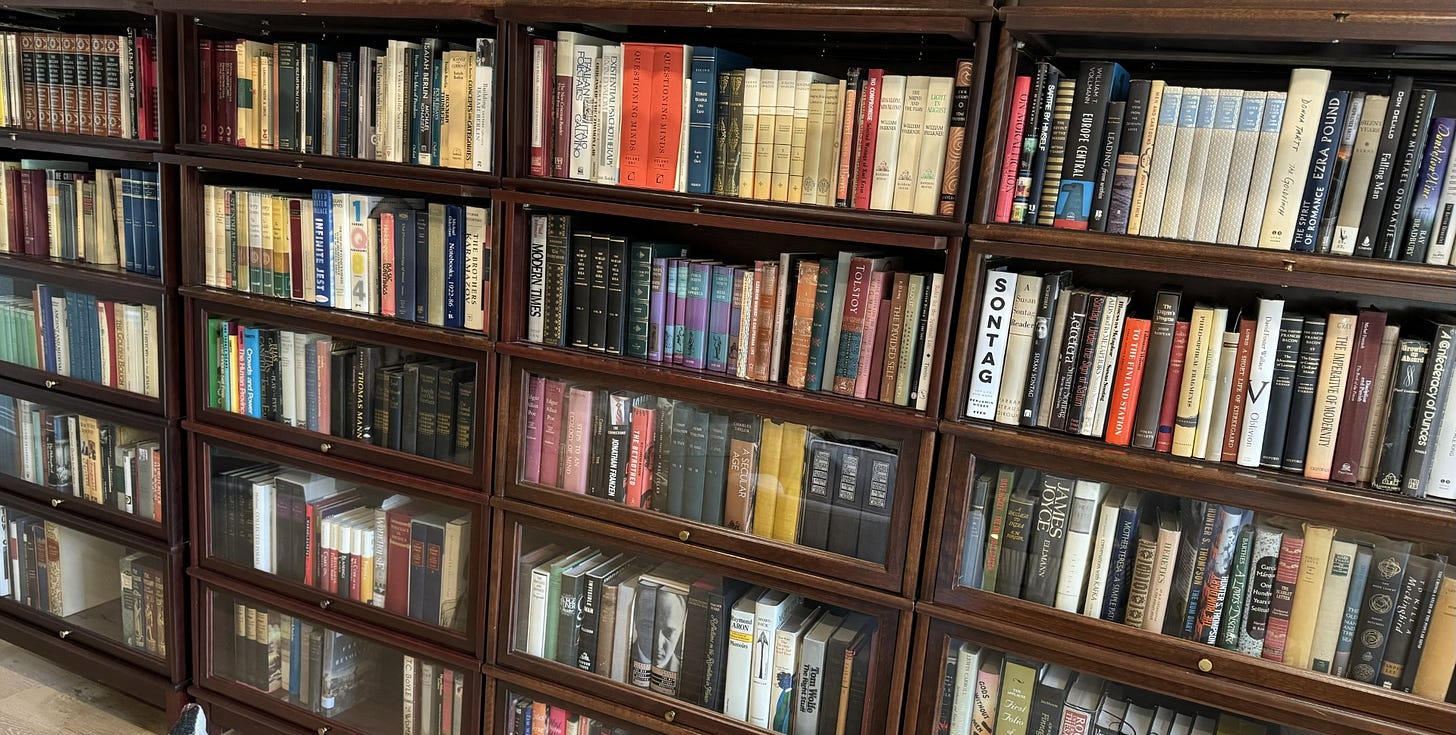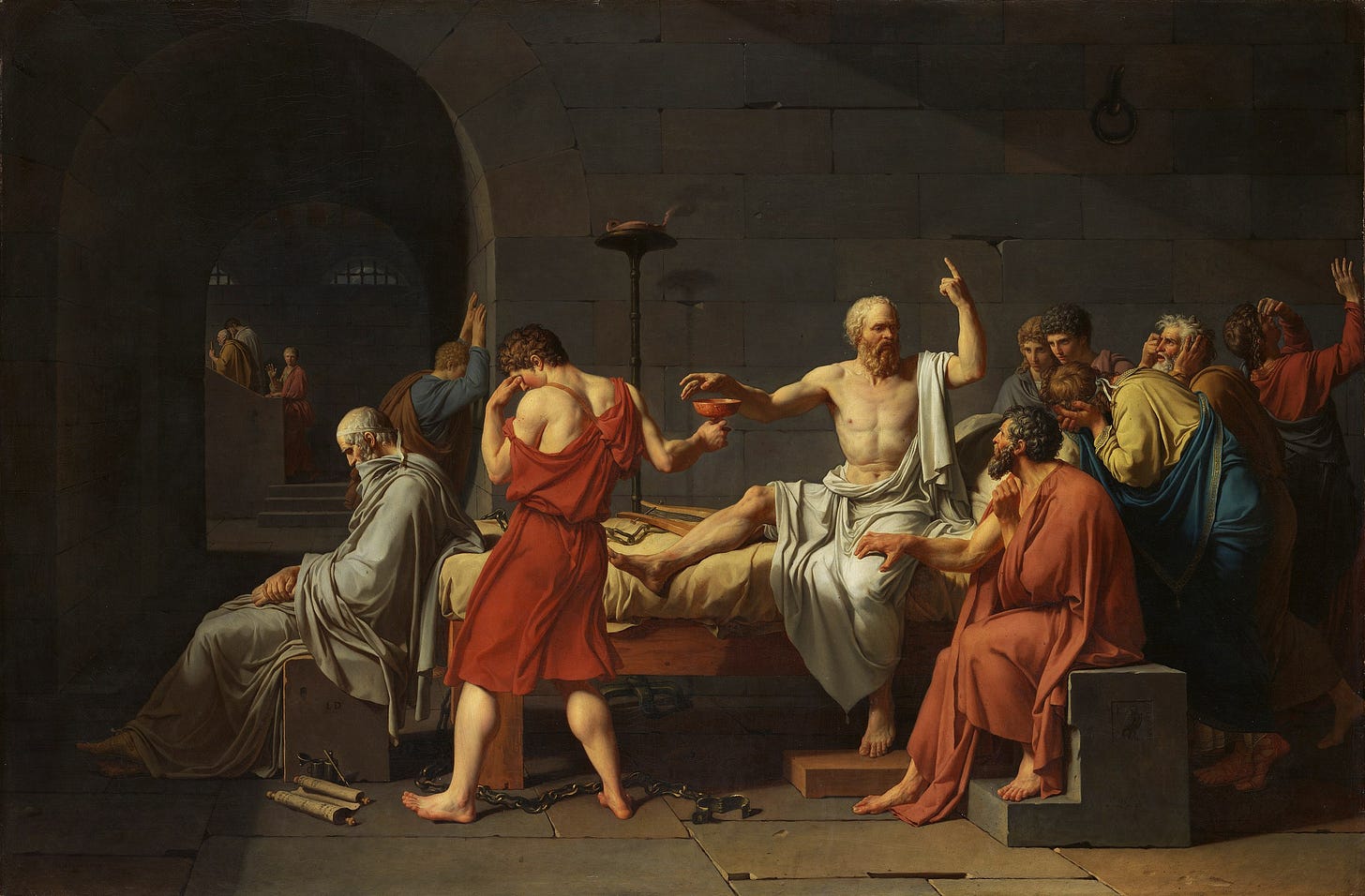A 12-Month Immersive Course in Humanities
Can you really learn this stuff by just reading 250 pages per week for a year? Let's try and find out.
Ever since I described my lifetime reading plan, people have asked me to recommend lists of books.
Frankly, the response was far beyond anything I expected—and more than just online comments and emails from ambitious readers. A New York editor at a major imprint asked me to turn my article into a full-length guide to arts and culture. And two different ‘great books’ colleges inquired about my availability.
These are attractive invitations, but I’ve declined them—and for good reasons.
If you want to support my work, please take out a premium subscription (for just $6 per month).
First, pursuing an education of this sort is a huge task, and daunting to encompass in any manageable way. I devised my own homemade learning plan in the humanities over the course of 50 years. And I still devote time every day to it.
It’s a way of life, not a quick fix.
Some things just take time. If you want to be a high performance athlete or chess grandmaster or concert pianist, you don’t look for short cuts. A humanities education is not much different.
But people are hungry for an entry path into this stuff—and they deserve guidance and support. For lack of good teachers (and they are truly in short supply) students stumble around.
I know what that’s like from personal experience. It’s easy to get lost in these books. You can waste years just treading water.
Amid this confusion, even an imperfect guide (me) is better than no guide at all.
So I gave myself a challenge. What would I do if I had students for one year, and they were willing to commit to reading around 250 pages per week.
Could I give them a solid foundation in culture?
I decided to try.
I don’t want to minimize the constraints here. I can’t assign a lot of 800-page books. I can’t do deep dives into my favorite thinkers. I have to cover thousands of years as expeditiously as possible.
There’s no one right answer here. And I fully anticipate complaints from folks whose favorite book was omitted, or who are unhappy due to their various ideological affiliations. (My request to critics—if you want to add a work, tell me which one I can leave out.)
But let’s jump in and see what we can do.
Are you ready?
If you want to support my work, please take out a premium subscription (for just $6 per month).
My 12-Month Immersion Program in Arts & Culture (Part 1 of 4)
By Ted Gioia
Here are the ground rules:
I will keep this manageable—we will only do around 250 pages of reading per week. That’s a daunting constraint, and rules out some options (no War and Peace in this course, sorry). But even with this limitation, we can still work wonders.
I’ll also suggest music for each week.
I’ll also add a visual arts suggestion (find it online) for each week.
Don’t be discouraged if you hit rough patches along the way. That’s part of the process. As they say in sports training: “No pain, no gain.”
If you can do this as part of a group, you will gain extraordinary benefits from discussing the weekly readings. But even solitary travelers will benefit from this journey.
Trust me, you can do this. And it will only take the same amount of time you might normally spend watching TV or scrolling on TikTok.
ONE FINAL NOTE: Some people hate this stuff. I mean totally.
It’s not just the reading they hate, but they’re outraged at the very notion of great works of culture. Their anger is palpable—I’ve experienced it directly, face to face.
So I must stress:
I’m not asking anyone to read these books.
I don’t put any expectations on people to know these works—not in the slightest.
I’m perfectly happy if you pretend these books don’t exist—you can even burn copies if you want (so long as you purchase your own and don’t burn mine).
In other words, you have my permission to go back to Instagram this very instant.
But I know some of you deeply care about these works—what they mean, and what they can do. If so, I am speaking to you. We may be few in numbers, but—in the words of Shakespeare—we are a “happy few.”
What others think or do is completely irrelevant to our project.
To all the others I’ll just say: Hey, please cut us some slack. We’re not limiting your screen time—so let us use our hours otherwise, if that’s our bliss.
Okay, let’s start!
WEEK ONE
Plato: The Final Days of Socrates (as told in four dialogues: Euthyphro, Apology, Crito, and Phaedo)
Plato: Republic, Books I, VII
I can’t find a better starting point—the most brilliant thinker of antiquity is forced to drink poison because the rulers didn’t like what he is saying. Socrates defends himself, but ultimately loses his life because he pursues truth not power. And the whole account is only around 150 pages.
This leaves us room to add books I and VII of Plato’s Republic—which give us a taste of justice, and introduce Plato’s famous Allegory of the Cave. Once you know this cave, you see it everywhere.
I prefer Jowett’s translations for Plato, but that’s a very old school choice. You might also consider the popular Complete Works of Plato volume featuring Grube’s translations of these dialogues.
(You can find my reading notes for Plato here.)
Musical listening for week one: Bach: The Well-Tempered Clavier (Book 1) and Goldberg Variations.
Art for week one (find it online): Paintings by Jacques-Louis David (including The Death of Socrates).
WEEK TWO
Sappho (and others): Lyrics
Homer: Odyssey: Books 1-10
The single most important moment in literary and musical history happened when people started singing about themselves and their feelings. Everything changed at that moment, and not just in the creative world—this is also a milestone in the emergence of human rights and personal autonomy.
By singing about your inner life, you publicly validate its importance.
Sappho did more than anyone to make this happen, but only the tiniest fragments from her work survive. So we will read her as well as other ancient lyric poets. (You might also call them singer-songwriters, because the word lyric comes from the name of the instrument they played, the lyre.)
(You can find my reading notes for Sappho here.)
The Lattimore collection of Greek lyric poetry is just 100 pages. So you can also start Homer’s Odyssey this week. There are many good translations of Homer, but Emily Wilson, Robert Fagles, or Robert Fitzgerald never nod, and won’t let you down.
Musical listening: We’re doing lyric songs, so listen to Schubert’s Winterreise and Joni Mitchell’s Blue.





